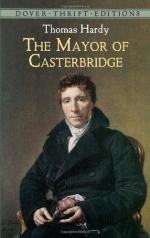Ever since the evening of his wife’s arrival with her daughter there had been something in the air which had changed his luck. That dinner at the King’s Arms with his friends had been Henchard’s Austerlitz: he had had his successes since, but his course had not been upward. He was not to be numbered among the aldermen—that Peerage of burghers—as he had expected to be, and the consciousness of this soured him to-day.
“Well, where have you been?” he said to her with offhand laconism.
“I’ve been strolling in the Walks and churchyard, father, till I feel quite leery.” She clapped her hand to her mouth, but too late.
This was just enough to incense Henchard after the other crosses of the day. “I won’t have you talk like that!” he thundered. “‘Leery,’ indeed. One would think you worked upon a farm! One day I learn that you lend a hand in public-houses. Then I hear you talk like a clodhopper. I’m burned, if it goes on, this house can’t hold us two.”
The only way of getting a single pleasant thought to go to sleep upon after this was by recalling the lady she had seen that day, and hoping she might see her again.
Meanwhile Henchard was sitting up, thinking over his jealous folly in forbidding Farfrae to pay his addresses to this girl who did not belong to him, when if he had allowed them to go on he might not have been encumbered with her. At last he said to himself with satisfaction as he jumped up and went to the writing-table: “Ah! he’ll think it means peace, and a marriage portion—not that I don’t want my house to be troubled with her, and no portion at all!” He wrote as follows:—
Sir,—On consideration, I don’t wish to interfere with your courtship of Elizabeth-Jane, if you care for her. I therefore withdraw my objection; excepting in this—that the business be not carried on in my house.—
Yours, M. Henchard Mr. Farfrae.
The morrow, being fairly fine, found Elizabeth-Jane again in the churchyard, but while looking for the lady she was startled by the apparition of Farfrae, who passed outside the gate. He glanced up for a moment from a pocket-book in which he appeared to be making figures as he went; whether or not he saw her he took no notice, and disappeared.
Unduly depressed by a sense of her own superfluity she thought he probably scorned her; and quite broken in spirit sat down on a bench. She fell into painful thought on her position, which ended with her saying quite loud, “O, I wish I was dead with dear mother!”
Behind the bench was a little promenade under the wall where people sometimes walked instead of on the gravel. The bench seemed to be touched by something, she looked round, and a face was bending over her, veiled, but still distinct, the face of the young woman she had seen yesterday.
Elizabeth-Jane looked confounded for a moment, knowing she had been overheard, though there was pleasure in her confusion. “Yes, I heard you,” said the lady, in a vivacious voice, answering her look. “What can have happened?”




